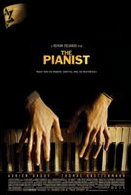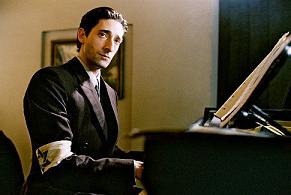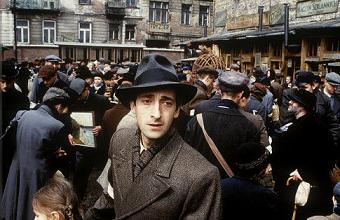The Pianist
Not only has Roman Polanski finally been able to make a film about the Holocaust, a project gestating almost as long as Scorsese’s three decade old
Gangs of New York, but the exiled Polish director has also

figured out the most effective way of portraying an event in history who’s magnitude of atrocity is at a scale so large that it an almost impossible feat to explore in a two hour motion picture. Polanski has the wisdom to narrow the focus of his film not to a group of people, or even to a single family, but to one person.
The Pianist is the true story of Polish pianist Wladyslaw Szpilman’s (Adrian Brody) adventuring survival from the beginning of the German occupation of Warsaw in 1939 to the Germans’ defeat at the hands of the Russians in 1945. With such a grand time scale ripe with opportunities to step away from the focus of the film to portray as much Nazi horror as possible, the film never escapes the limited, passive and humble vantage point of Szpilman as he stumbles around the rotting city of Warsaw trying to escape detection.
Even if there was any in his book to begin with, Roman Polanski and writer Ronald Harwood drain any possible degree of sentiment out of Wladyslaw Szpilman’s autobiographical struggle, and
The Pianist goes only as far as to utilize the absolutely open,

vulnerable and awe filled face of Adrian Brody to give any hint of emotion to Szpilman’s story. Polanski’s camerawork and direction are utterly objective, capturing from a cold distance the bleak grey palette of Warsaw and Warsaw ghetto life (though the only difference is in the ghetto there is a multitude of people in the streets, dead and alive). By allowing the camera to simply capture film of the war instead of actively seeking it out, the Warsaw ghetto of
The Pianist becomes an architecturally oppressive one with the buildings crushed together, omnipresent, unmovable, and held in by Nazi made brick barriers. Even the sky is partially invaded by the crumbling squalor of the city’s poverty, and after escaping the ghetto Szpilman comments that sometimes he cannot even tell if he is in the Warsaw ghetto behind the Nazi wall or still in the city of Warsaw outside the wall.
From Szpilman’s limited vantage point-he escapes the trains to Treblinka to work in a small Jewish construction group in Warsaw and then escaped the ghetto to be hidden in various safehouses around Warsaw-one can actually see the stages the grim, cold and empty city of Warsaw goes through, at times mirroring Szpilman’s infinitely smaller attempt at survival through the terror. The famous uprising of the Warsaw ghetto on April 19 1944 is seen solely through a limited alley view from Szpilman’s safehouse window, as Jews hidden in an apartment block snipe passing German soldiers and are eventually burnt out of hiding, Polanski has given his film a manageable scale, one almost terrifyingly limited as the horrors of the worst of wars are scene from one man who is not only distanced and separated from the center of the atrocities but trying to run from them.
Szpilman himself is a conflicted man, an acclaimed pianist who ends up performing background music in a restaurant in the ghetto that caters to the wealthy Jews who build a small wartime fortune off the blackmarket by exploiting the poorer people in the ghetto. Szpilman wants to help the resistance, which his brother actively and passionately takes part in,

and Szpilman is nearly motivated into action when a Jewish policeman saves him from the train that takes his family to their deaths in Triblinka, but instead the policeman’s act only sentences him to a life of guilt. Szpilman is passive, and Brody’s eyes are the kind that are endless sinkholes, able absorb everything around them, rendering Szpilman dumbstruck, as he cannot believe what his eyes are telling him. Polanski’s protagonist, once escaped from the Jewish ghetto, stumbles around Warsaw to safehouses in a stupor, on some kind of auto-pilot for survival, but never fully comprehending the magnitude of what is happening around him, or what is happening to him. Thus the man never takes action, and with the film already having achieved an objective, unsentimental tone,
The Pianist also has for its lead a man who is boxed in by a decaying city, first hemmed in by Nazi walls, then by Nazi oppression, then by helpless need to aid his people, and finally he is forever pinned inside the city of Warsaw from the Resistance attacking the Nazis, the Nazis attacking the Resistance, the Russians bombing everyone and ultimately the Germans and Szpilman both crumbling from the onslaught of the Russians. The pianist can never leave the city, even if he wanted to.
Szpilman may have escaped the

ultimate terrors of the Holocaust, the extermination and labor camps, but he and many like him all over Europe were trapped in their own unique kind of concentration camp, surrounded and trapped by crumbling, hollow cities full of death and decay and no relief in site, only temporary sanctuary to live to die another day. Though he is labeled as a famous pianist Szpilman is the everyman, passive and selfish in the worst situations, and even the title of the film reduces the man to a type of worker. It is Polanski’s unique vision of the Holocaust to create a film about the trials and tribulations of this one individual Pole that it can, in turn (and without allegory or symbolism), purely through focused, quality filmmaking, make a film about any man or woman trapped and forced to survive during the war. The context of Nazi horrors only makes his struggle harder and his success more miraculous, but in the end Roman Polanski has simply told the one of the world’s best, and most applicable, survivalist tales.


0 Comments:
Post a Comment
Subscribe to Post Comments [Atom]
<< Home